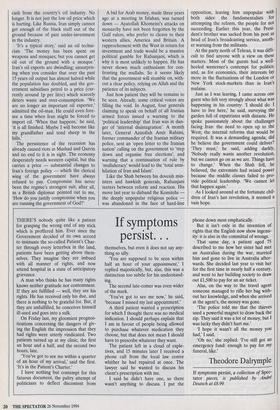If symptoms
persist. . .
THERE'S nobody quite like a patient for grasping the wrong end of any stick which is proffered him. Ever since the Government decided of its own accord to insinuate the so-called Patient's Char- ter through every letterbox in the land, patients have been getting above them- selves. They imagine they are imbued with all manner of rights, and now attend hospital in a state of anticipatory grievance.
A man who thinks he has many rights knows neither gratitude nor contentment. If they are fulfilled — well, they are his rights. He has received only his due, and there is nothing to be grateful for. But, if they are unfulfilled, he conceives himself ill-used and goes into a sulk.
On Friday last, my gloomiest prognos- tications concerning the dangers of giv- ing the English the impression that they had rights were utterly vindicated. Two patients turned up at my clinic, the first an hour and a half, and the second two hours, late.
'You've got to see me within a quarter of an hour of my arrival,' said the first. `It's in the Patient's Charter.'
I have nothing but contempt for this fatuous document, the paltry attempt of politicians to deflect discontent from themselves, but even it does not say any- thing so silly.
'You are supposed to be seen within half an hour of your appointment,' I replied majestically, but, alas, this was a distinction too subtle for his understand- ing.
The second late-comer was even wider of the mark.
`You've got to see me now,' he said, `because I missed my last appointment.'
A third patient wanted a prescription for which I thought there was no medical indication. I should perhaps explain that I am in favour of people being allowed to purchase whatever medication they choose, but that does not mean I should have to prescribe whatever they want.
The patient left in a cloud of exple- tives, and 15 minutes later I received a phone call from the local law centre whither he had repaired at once. The lawyer said he wanted to discuss his client's prescription with me.
I said he didn't have one, so there wasn't anything to discuss. I put the phone down most emphatically.
But it isn't only in the invention of rights that the English now show ingenu- ity: it is also in the committal of wrongs.
That same day, a patient aged 75 described to me how her sister had met an Australian during the war, married him and gone to live in Australia after- wards. She decided last year to visit her for the first time in nearly half a century, and went to her building society to draw out £1,500 to pay for an air ticket.
Alas, on the way to the travel agent someone managed to rifle her bag with- out her knowledge, and when she arrived at the agent's, the money was gone.
'The police told me that the thieves used a powerful magnet to draw back the zip. They said it was a lot of money, but I was lucky they didn't hurt me.'
'I hope it wasn't all the money you had,' I said.
'Oh no,' she replied. 'I've still got an emergency fund: enough to pay for my funeral, like.'
Theodore Dalrymple
If symptoms persist, a collection of Spec- tator pieces, is published by Andre Deutsch at f8.99.










































































 Previous page
Previous page